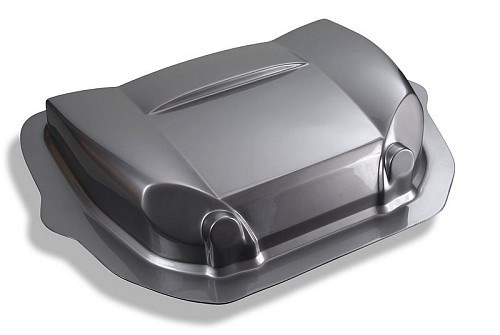Liquid Thermoplastics Process Like Composite Thermosets
The continued evolution of thermoplastic composites just got even more interesting with this week’s launch by Arkema of the first range of a novel family of liquid thermoplastics that are transformed via reactive closed-mold processes such as room-temperature infusion, RTM, and flex-molding as used for composite thermosets.
The continued evolution of thermoplastic composites just got even more interesting with this week’s launch by Arkema of the first range of a novel family of liquid thermoplastics that are transformed via reactive closed-mold processes such as room-temperature infusion, RTM, and flex-molding as used for composite thermosets. Elium resins boast quick polymerization and can be used to design structural parts as well as aesthetic elements in the automotive, transportation, wind power, sports and building and construction industries.
Arkema formulated these novel resins based on a high-molecular-weight acrylic polymer under peroxide initiated radical polymerization, using the company’s Luperox organic peroxide which was specifically developed for this purpose, according to product manager Sebastien Taillemite. Composite parts made from Elium are 30-50% lighter than their steel counterparts, but offer the same resistance. Such parts cost less to manufacture than other thermoplastic composite technologies: they are said to be easy to use in thermoset processes, transform at room temperature, and do not contain any fabricated products like organo-sheets. Elium resins have a range of reactivity based on the grade. Certain grades have been optimized for elevated temperature curing in a matter of minutes to room temperature with part cycle times ranging from 20 min. to a few hours depending on the part size and process.
Says Taillemite, “The technology allows us to obtain a thermoplastic polymer that is recyclable, weldable and thermoformable at 200-220 C (392-428 F), and its high molecular weight results in mechanical properties that are excellent and enable the manufacture of structural parts with both carbon fiber and glass fiber, when the correct sizing is used.” He gives the example of Arkema’s collaboration with Belgium fiberglass producer 3B to develop a specific glass fiber sizing that enhances matrix-fiber adhesion. At this stage, Elium has been brought to the level of epoxies with respect to mechanical properties, but with much higher toughness than epoxies and no need for post-curing to reach the glass transition temperature (Tg). The company has customers who have made very different parts from Elium, from boat hulls to vehicle parts, and also most recently a wind blade. Traditional plastics processing equipment can be utilized in the reprocessing of recycled and reclaimed material.
The company will be exhibiting some of these parts at JEC Europe in Paris next week. We hope to gain more insight on this new development and possibly incorporate it into our Thermoplastic Composites for Automotive conference program jointly developed by Composites World and Plastics Technology and co-located with Amerimold 2014 in June.
Related Content
-
Packaging Waste Will Become Composite Decking
New partnership will incorporate process waste into wood-alternative decking.
-
Advanced Drainage Systems to Build New Florida Manufacturing Facility
New manufacturing facility will complement other ADS facilities in the southeast region.
-
Nexkemia Acquires Polystyrene Recycling Assets
The polystyrene manufacturer finalized its purchase of Eco-Captation, a recycler.
















